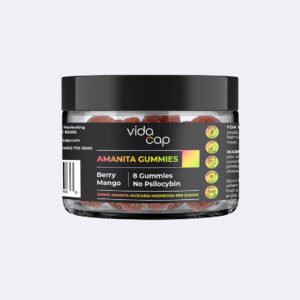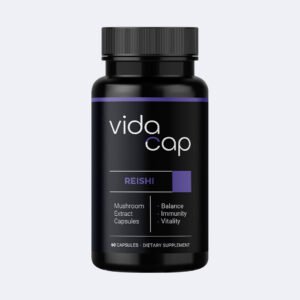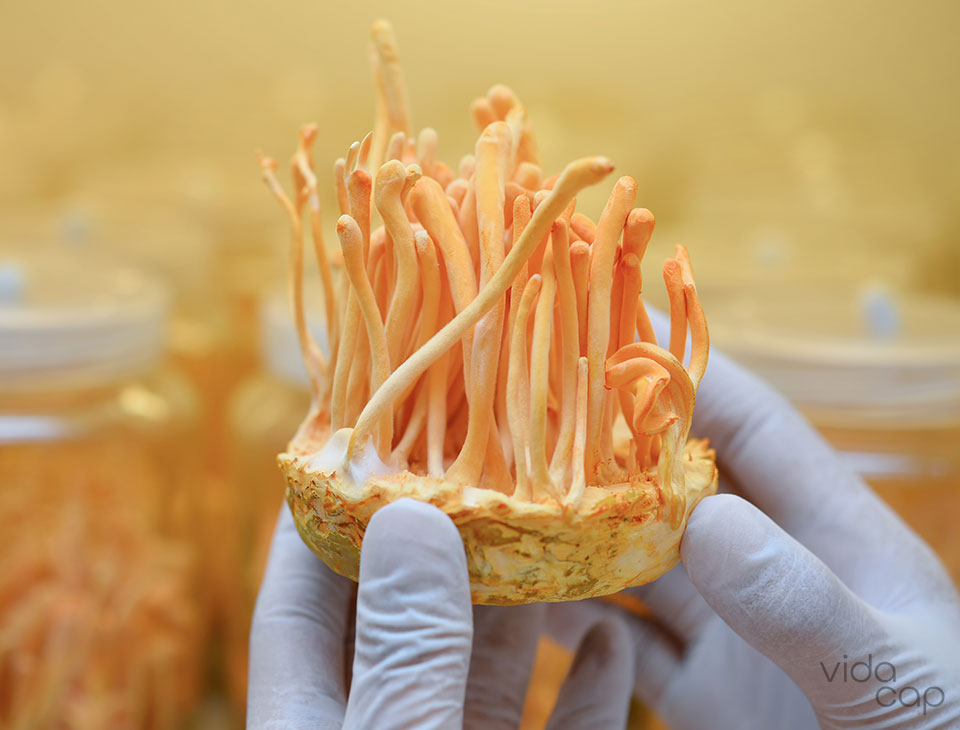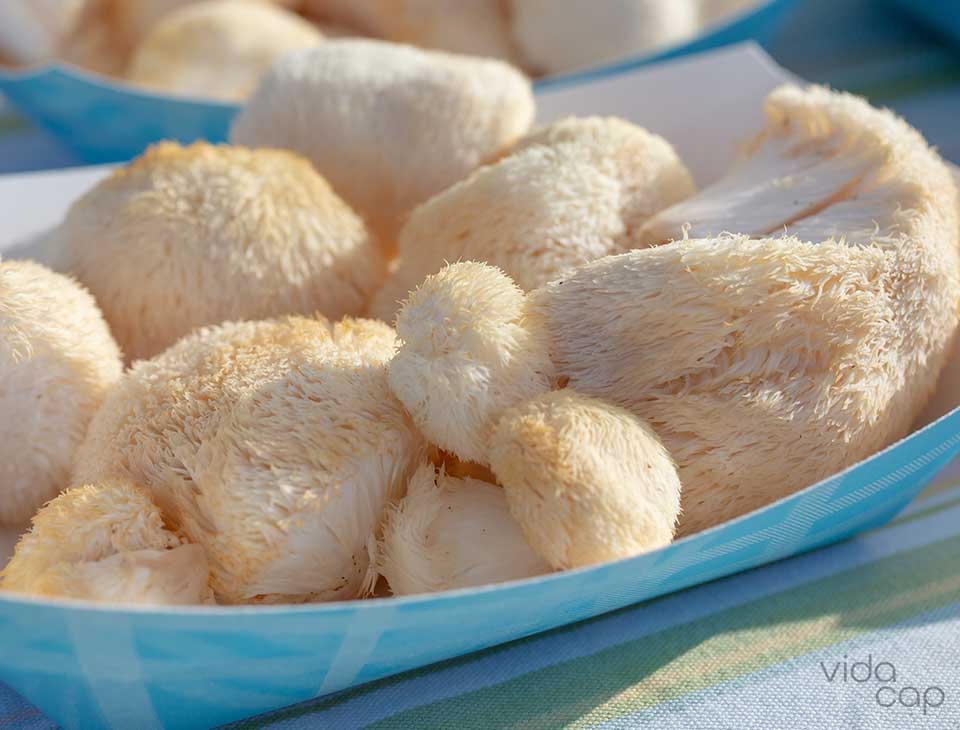
What Are the Best Mushroom Supplements for Dogs?
 Audrey Ferguson |
Updated on: March 26, 2024
Audrey Ferguson |
Updated on: March 26, 2024
People are becoming more aware of the many uses of functional mushrooms, but few people realize that they could also benefit dogs.
Mushroom supplements are generally considered safe for canine consumption as long as you choose the right products from a reputable brand.
This guide outlines the best mushrooms for dogs and delves deeper into their potential health benefits.
Why Give Mushrooms to Your Pet?
Mushrooms are widely considered superfoods as they are packed with nutrients and other beneficial compounds, including:

- B vitamins
- Vitamin D
- Essential minerals
- Protein
- Triterpenes
- Sterols
- Antioxidants
- Polysaccharides, such as beta-glucans
These nutrients can benefit animals as much as humans, and there are many amazing mushrooms to choose from, each with its own unique properties.
Read on to learn more about seven of the most popular functional mushrooms and their uses.
7 Potentially Safe & Healthy Mushrooms for Dogs
Dogs can eat many of the same mushrooms that humans can, including button, cremini, and portobello mushrooms, which are all, in fact, the same mushroom (Agaricus bisporus) at different stages of growth.
These mushrooms are highly nutritious and can be a useful addition to your dog’s regular diet (see below for our favorite mushroom recipes for dogs). However, the following mushrooms could offer even more benefits:
1 – Shiitake
Shiitake (Lentinus edodes) mushrooms are an excellent source of protein, including numerous essential and non-essential amino acids. They also contain various other active compounds, including beta-glucans, steroids, terpenoids, phenols, and various others associated with lowering cholesterol.
Indeed, research suggests this mushroom could help individuals with hypertension and high cholesterol.
2 – Reishi
Sometimes known as “the mushroom of immortality,” reishi (Ganoderma lucidum) might not help you or your pet live forever, but it does have many potential benefits for health.
Reishi is rich in amino acids, polysaccharides, and triterpenoids and is particularly well known for its immunomodulating properties. It has antioxidant and anti-inflammatory properties and could help to regulate blood sugar.
3 – Cordyceps
Various cordyceps species contain a wealth of active compounds, including polysaccharides, ergosterol, and a unique chemical called cordycepin. These mushrooms have been used in Chinese medicine for centuries, primarily to nourish the kidneys and lungs. This is supported by modern research, which suggests cordyceps could help improve respiratory function in COPD and benefit patients with chronic kidney disease.
4 – Maitake
Maitake (Grifola frondosa) is a delicious culinary mushroom that has been used medicinally in Japan and China for thousands of years. It is rich in active compounds, including polysaccharides, sterols, and phenolic compounds, and is primarily used for its immunomodulating properties.
5 – Lion’s Mane
Lion’s mane (Hericium erinaceus) is another tasty edible mushroom with numerous benefits for health.
It contains two unique classes of chemicals: hericenones and erinacines. These compounds stimulate nerve growth factors and are strongly associated with neurological health and improved cognitive function.
6 – Turkey Tail
Turkey tail (Trametes versicolor) is among the best fungal sources of polysaccharides, particularly polysaccharide peptide (PSP) and polysaccharide Krestin (PSK). These compounds are best known for their effects on the immune system, and it is currently one of the most thoroughly researched functional mushrooms, with at least one study confirming its potential benefits for dogs.
7 – Chaga
Finally, we have chaga (Inonotus obliquus), which is not technically a mushroom but a sclerotium, a parasitic fungal mass that grows on birch trees. Chaga’s symbiotic relationship with birch gives it two of its most important active components, betulinic acid and betulin. They have antioxidant, anti-inflammatory, and antiviral properties.
Are Mushrooms Safe for My Dog?
Most mushrooms that are safe for humans appear to be safe for canines, too. However, you should always consult your veterinarian before starting your dog on mushroom supplements, just to be on the safe side.

Furthermore, it is crucial to pay attention to the dosage and remember that a small dog will need a lower dosage than a large dog, and a large dog will need a lower dose than a human. Again, you should speak to your veterinarian to determine the optimal mushroom dosage for your dog.
If you want to feed your dog edible mushrooms, avoid cooking them with garlic or onions because those ingredients will make your dog very ill. We also advise against feeding your pet raw mushrooms.
How to Give Mushroom Supplements to Your Dog
If your dog will swallow capsules, you can give them mushroom supplements in capsule form. Otherwise, you can break the capsules open and sprinkle their contents onto food or use a mushroom powder or tincture instead.
Another simple option is to brew mushroom tea for your dog. Put one-third of a cup of dried mushrooms of your choice into a cup’s worth of water. Bring to a boil and simmer for 20-40 minutes, then allow your dog to drink the resulting liquid.
You could also use some of the mushrooms featured above to create a tasty treat for your pet. Here are three mushroom recipes for dogs that you could try when you have some extra time on your hands.
Shiitake Broth
You will need:
- 1/4 cup of chopped carrot
- 1/4 cup of chopped beetroot
- 1/4 cup of chopped celery
- 1/2 teaspoon of turmeric powder
- 1 teaspoon of salt
- A beef bone
- 5 dried shiitake mushrooms
Directions
- Soak the shiitake mushrooms in a cup of cold water overnight.
- The next day, place the remaining ingredients in a pot with at least four cups of water.
- Bring to a boil then reduce the heat, cover, and simmer for 60 minutes.
- Add the mushrooms (with the water you soaked them in), simmer for another 60 minutes, then strain.
This broth is perfect for dogs with appetite problems. Give them a teaspoon every couple of hours until their appetite improves.
Frozen Mushroom Dog Treats
You will need:
- 1 cup of sliced fresh mushrooms
- 4 cups of water
- Herbs and spices according to your dog’s preference
Directions
- Place all of the ingredients in a pot.
- Bring to a boil, cover, and simmer for 20 minutes.
- Wait for the mixture to cool, then puree it in a food processor.
- Pour the puree into ice cube molds and place them in the freezer.
Next time your dog earns a treat, give them something healthy. Most dogs will enjoy the crunchiness of the ice cubes combined with the delicious mushroom flavor.
Mushroom Scramble
You will need:
- 1/2 cup of chicken broth
- 1/4 cup of finely chopped celery
- 1/4 cup of finely chopped kale
- 1/2 cup of sliced mushrooms
- A pinch of salt
- 2 tablespoons of organic butter
- 4 beaten eggs
Directions
- Place the broth in a wok on high heat.
- Add the celery, kale, mushrooms, and salt cooking until only half the broth remains.
- Place the eggs into the mixture and stir until they are cooked.
- Serve once the food cools. You can add cooked brown rice if you wish.
There are many more recipes available online, so there are plenty of options for feeding mushrooms to your dog.
The Best Mushroom Supplements for Dogs: Final Thoughts
To summarize, mushrooms are generally considered safe for canine consumption as long as you stick to varieties that are also safe for humans. The mushrooms discussed in this article contain various nutrients that are good for dogs and people alike.
Potential benefits include enhanced immune function and reduced inflammation, among others. You can give your pet a pre-manufactured supplement or create delicious recipes featuring mushrooms alongside other tasty ingredients if you have time.
-
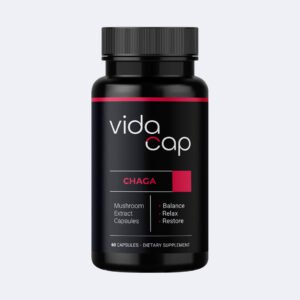 Chaga Mushroom CapsulesBalance | Relax | Restore$28 Add to cart
Chaga Mushroom CapsulesBalance | Relax | Restore$28 Add to cart- Supports Metabolic Health*
- Supports Digestive Health*
- Promotes Youthfulness*
- Natural Antioxidant*
- 60 Capsules Per Bottle
- 750mg of Chaga Mushroom

Audrey has worked as a registered dietitian for 6 years. She graduated from the University of Florida in 2013 with a Bachelor of Science degree. In 2014 she began an internship with the Veterans Affairs Healthcare System, and was hired as an Outpatient Dietitian following graduation. She started her career counseling a variety of patients with different health concerns and disease states. After a few years into practice, she found her passion was working in cancer care, and has spent the last 4 years specializing in oncology nutrition.
In her practice, Audrey has spent a significant amount of time reviewing literature on herbal and dietary supplements in the cancer care setting. Through her work at Vidacap, she hopes to continue to expand her knowledge and understanding of the benefits of supplements in conjunction with promoting a healthy, balanced diet and management of overall health and well being.

